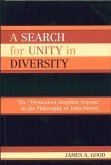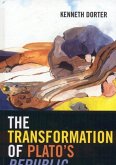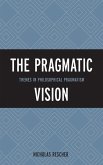A Search for Unity in Diversity examines the traditional readings of John Dewey's relationship to Hegel and demonstrates that Dewey's later pragmatism was a development of the historicist/humanistic Hegel, rather than a turning away from Hegelian philosophy. Good argues that Dewey drew upon resources he found in the writings of St. Louis Hegelians to fashion a non-metaphysical reading of Hegel. A Search for Unity in Diversity reasons that Hegel encouraged Dewey to understand philosophy as an exercise in individual and cultural reconstruction. Beyond exposing fatal flaws in the traditional reading of Dewey's relationship to Hegel, Good shows that Dewey's pragmatism is a development, rather than a rejection, of Hegel's philosophy. This not only explains Dewey's Hegelian deposit, it also sheds light on why recent Hegel scholars have found elements of pragmatism in Hegel's thought and provides grounds for rapprochment between American pragmatism and Continental European philosophy.
Bitte wählen Sie Ihr Anliegen aus.
Rechnungen
Retourenschein anfordern
Bestellstatus
Storno









